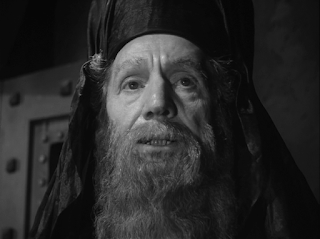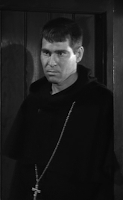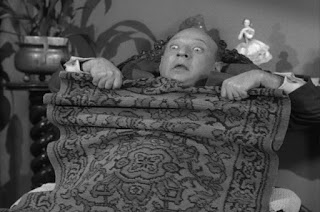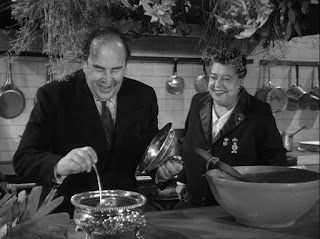by Jack Seabrook
Victor Wolfson's last teleplay for Alfred Hitchcock Presents was "The Ikon of Elijah," which is credited to him and Norah Perez. The episode was based on a short story of the same title by Avram Davidson that was first published in the December 1956 issue of Ellery Queen's Mystery Magazine.
The story begins in Nicosia, the capital of the island of Cyprus, which was a British colony at the time. Mr. Carpius, a dealer in antiquities, arrives home to his shop and greedily asks his assistant, Paul, what was sold while he was away. Complaining about his own failure to purchase an ikon of St. Mamas that had been removed from a chapel by the bishop for safekeeping, Carpius plans to have it stolen or "'to offer to sell it on commission.'" A man named Calloost Chiringirian arrives with an English customer who is looking to buy a farewell present for his superior officer; Chiringirian boasts about having bought the ikon that Carpius had sought and Carpius recalls fondly the unrest in Russia and Asia Minor that had resulted in many treasures from churches and monasteries being bought and sold.
 |
| "The Ikon of Elijah" was first published here |
Carpius flatters the man and pretends to be seeking "'true religion'"; he is welcomed and given food and a bed for the night. Later that night, he sneaks into the cell where the ikon is guarded by a sleeping monk. Carpius reaches for the ikon, intending to switch it for the copy he bought, when the monk awakens and raises the alarm. Surprised, Carpius strikes and kills the monk with his heavy flashlight. The other monks rush to the cell and Carpius explains that the death was an accident. The Father Superior forgives him and, as Carpius turns his back to switch the copy of the ikon for the original, he hears the cell door close and the lock turn. The Father Superior instructs him to "'Pray without ceasing'" and tells Carpius that they will feed him as long as he lives.
 |
| Oscar Homolka as Carpius |
"The Ikon of Elijah" is a brilliant, haunting story in which a greedy man gets his just desserts, rewarded by the very people he thought he would rob. Carpius is depicted as morally bankrupt, profiting from war and the misery it brings and happy to take religious treasures from the church and sell them to collectors. When he can't buy them legitimately, he will purchase them illegally or steal them.
Carpius is welcomed by the monks in keeping with their tradition of generosity to strangers, yet he intends to take advantage of them. At the end, the Father Superior promises to "'feed you as the ravens fed Elijah,'" and the command to pray for forgiveness seems apt in light of Carpius's crime of murder. He has been given a life sentence and locked in a cell, just as he would have been if he were convicted in civil court.
The Alfred Hitchcock Presents adaptation of "The Ikon of Elijah" aired on January 10, 1960, but it was not the first time that Davidson's story had been adapted for television. A Canadian TV series called The Unforeseen aired an adaptation on October 23, 1958, and IMDb credits the teleplay to Norah Perez, who is also co-credited with writing the teleplay for the version produced for Alfred Hitchcock Presents. I have not been able to find any episodes of The Unforeseen available for viewing, so this one may be lost. It is possible that Victor Wolfson revised Perez's teleplay for Alfred Hitchcock Presents and she was co-credited because she wrote the original teleplay. She is still alive and I have written to her to ask if she recalls this project; I will update this post if she replies.
 |
| Sam Jaffe as the Father Superior |
The Alfred Hitchcock Presents version of "The Ikon of Elijah" is a powerful episode that differs from the short story in certain ways but is remarkably faithful to Davidson's original text. The show opens in the antique shop, with the camera peering between antiques as Carpius arrives home and his assistant Paul tells him that a monk had been there to sell a copy of an ikon. The initial scene setting in the story has been removed and the central event is introduced right away. Carpius complains about his time away from the store, saying "'How I despise this miserable island! It's a filthy prison cell, but someday I shall break free!'" The teleplay plants the seed of a prison cell in the viewer's mind, but Carpius does not know that his metaphor will soon become reality.
In addition, while the story has Carpius complain about his inability to procure a different ikon on his trip, the teleplay eliminates that potential source of confusion for the viewer and has Paul introduce the ikon of Elijah right at the start. After the initial conversation between Carpius and Paul, the TV version introduces a new scene and a new character in Malvira, a beautiful young woman who appears to be Carpius's wife. In the short story, there are a few references to "old Eleftheria in the kitchen," who seems to be Carpius's cook rather than his spouse. He questions her about the monastery before she totters off to bed. In the TV version, Malvira enters and appears bored; Carpius strokes her cheek and kisses her neck. She serves him food with a cynical demeanor while he expresses excitement over his dinner; he promises her more but she has heard it all before.
 |
| A.E. Gould-Porter as Major Parslow |
After adding a pretty woman to the story and suggesting a motive for Carpius's later acts in his desire to please her and keep her by his side, the teleplay returns to the scene in the story where Chiringirian brings Major Parslow to the shop to select a gift. A large, Christian statute is displayed prominently in the store, foreshadowing the later scenes in the monastery and, instead of Chiringirian boasting to Carpius that he bought the ikon Carpius had set out to purchase on his recent trip, Chiringirian takes Carpius aside and asks if he has found an item for another client, who wants a genuine ikon and who is not particular about its provenance. This gives Carpius another reason to want to pilfer the ikon from the monastery; now, both his wife and his business associate demand more from him. Chiringirian's approach also demonstrates that Carpius is not alone in his willingness to pilfer religious treasures for profit.
In the story, even though Carpius agrees to Chiringirian's reduced price when he sells an item to the major, it is revealed that he still made a "four hundred per cent profit," while in the show, it seems likely that the two colleagues are secretly working together to take advantage of the representative of the country's colonizers. Malvira returns for another scene that is not in the story, as she tells Carpius she is leaving him. At first, he flatters her and counsels patience, but when she is not swayed he reminds her that she owes everything to him since he took her out of the marketplace and brought her into his home. He threatens to kill her and they both laugh, suggesting that this exchange has occurred many times before.
 |
| Richard Longman as Chiringirian |
As in the story, Carpius is about to close up shop for the night when Theodoros the monk arrives with the ikon copy. The exchange between the two men follows that of the story closely and it is Theodoros who tells Carpius the history of the monastery; in the story, Carpius questions Eleftheria after the monk departs. In the TV version, Carpius rushes in to tell Malvira about the ikon, planning to travel to the monastery and return with the treasured item that Chiringirian has asked him to procure.
The first half of "The Ikon of Elijah" is set in the secular world of Carpius's antique shop, where he is in charge and makes deals with both his customers and his wife to maintain his lifestyle. He sees religious ikons as simply more items to profit from and he is willing to do whatever it takes to get them. The second half of the TV show is set in the sacred world, and the story's description of Carpius's trip from his home to the monastery is deleted. Instead, the scene fades in on a shot of mountains, then dissolves to a shot of the exterior of the stone monastery, and finally dissolves to a shot of Carpius knocking on its wooden front door. In three wordless shots, all of the information the viewer needs to know is provided.
 |
| David Janti as Paul |
Carpius is admitted by Brother Constantine, a monk who has taken a vow of silence, and when Carpius meets and speaks with the Father Superior, his words carry the same false piety that they do in the short story. In the TV version, Carpius successfully petitions the old monk to let him see the original ikon before retiring to his cell; he is taken to a downstairs room where he looks through a small window in a door and sees a monk praying before the ikon, which is displayed on a wall. Entering the room, Carpius sees that Brother Damianos guards the treasured object and the Father Superior tells the antique dealer that it is "'An honor not lightly earned--Brother Damianos would give his life for it.'" This turns out to be more foreshadowing of later events since the monk will later be killed while trying to guard the ikon.
The expression on Carpius's face as he regards the ikon is one of naked greed. Hours pass and, at midnight, we see Carpius sitting alone in his cell, eating, when a bell tolls the hour. He takes a cloth and a bottle of ether from his bag, along with the copy of the ikon and a heavy flashlight. Carpius removes his shoes and exits his cell, but he does not see a monk observe him, though we witness it in shadow. This moment of near discovery is not in the short story, but in the TV version, Brother Constantine follows Carpius and they struggle in silhouette. Constantine takes the flashlight and Carpius insists he is just walking about because he couldn't sleep. He returns to his cell. This scene succeeds in increasing the suspense of the situation and it is followed by a similar one, where Carpius again sits in his cell and a bell tolls two a.m.
 |
| William Green as Brother Theodoros |
Sneaking out once again, he sees Brother Constantine asleep in his cell and approaches the room where the ikon is kept. He peers in and sees brother Damianos asleep, then creeps in silently and switches the copy for the original. Carpius suddenly stumbles and awakens the monk; the antique dealer grabs a heavy candlestick and bludgeons him with it. The candlestick replaces the flashlight as the murder weapon and symbolizes Carpius's willingness to turn a sacred item into a secular weapon. The final moments of the concluding scene follow those in the story closely, with one exception: in the story, Carpius turns to switch the copy of the ikon for the original, while in the TV version he turns and kneels down to pray for forgiveness before the copy on the wall.
"'As long as you live, this will be your world,'" says the Father Superior, and the show ends with a shot of Carpius staring out of the small window in the locked door as the Father Superior walks away and the screen fades to black. The expression on the antique dealer's face is one of puzzlement--what is happening to him? He seems amazed at the suddenness of his fate and how things have turned against him. Minutes ago, he was a successful businessman who was confident in his ability to steal a religious treasure and get away undetected. Now he is a prisoner for life, his fate dealt to him by the very monks whose piety he inwardly mocked. The sense of divine retribution is delicious!
 |
| Danielle de Metz as Malvira |
The adaptation of "The Ikon of Elijah" for Alfred Hitchcock Presents is outstanding, keeping all of the important elements of the short story while adding new emphases that help to tell the story in a visual medium. Oscar Homolka gives an excellent performance as Carpius and is totally believable as the grasping, greedy character whose motivations in the TV version seem a bit more complex than they do in the short story. Perez and Wolfson's teleplay succeeds in making the ending both unexpected and inevitable, and Paul Almond's direction contrasts the more brightly lighted secular world of the first half with the shadowy confines of the monastery in the second half. The honest behavior of the monks is contrasted with the dishonest behavior of Carpius, and each of their acts generates different results.
 |
| Robert Richards as Brother Constantine |
Norah Perez (1933- ) is a Canadian author whose first credit was as an actress in a 1948 film written and directed by her father, Leslie MacFarlane, who wrote the first 21 books in the Hardy Boys mystery series under the pseudonym of Franklin W. Dixon. Perez co-wrote an episode of a TV show with her father in 1954 and is credited with writing the teleplays for three episodes of The Unforeseen, a Canadian suspense TV series that ran from 1958 to 1960. She seems to have stopped writing for TV and focused on writing novels for young adults, and she has published at least eight of them since 1968. Perez is still alive at age 89 and living in upstate New York, near the Canadian border; her most recent novel was published last year.
The director of "The Ikon of Elijah," Paul Almond (1931-2015), was also Canadian. He wrote for TV from 1955 to 1966 and for film from 1968 to 1992; he directed for TV from 1955 to 1979 and for film from 1962 to 1992. He also worked on the Canadian TV series On Camera and The Unforeseen, as did Norah Perez, and it's possible that he directed the 1958 TV version of "The Ikon of Elijah," whose director is uncredited in available sources. It is possible that the producer of Alfred Hitchcock Presents was aware of the earlier adaptation and used Perez's teleplay and that version's director to craft a new version. Like Perez, Almond was also a novelist.
 |
| Fred Catania as Brother Damianos |
Starring as Carpius is the great actor Oscar Homolka (1898-1978). Born in Vienna, Homolka served in the Austro-Hungarian Army in WWI and began his career on the Austrian stage before leaving Germany when Hitler came to power. He was on screen from 1926 to 1976 and his films included Hitchcock's Sabotage (1936), Ball of Fire (1941), and I Remember Mama (1948). He was on TV from 1951 to 1976 and he was seen on Thriller and in three episodes of Alfred Hitchcock Presents, including "The Hero."
Sam Jaffe (1891-1984) plays the Father Superior; born Shalom Jaffe, he was on screen from 1934 to 1984 and appeared in films including The Asphalt Jungle (1950) and The Day the Earth Stood Still (1951) and TV shows such as Batman and Night Gallery. He was in one other episode of Alfred Hitchcock Presents: "The Greatest Monster of Them All."
In smaller roles:
- A.E. Gould-Porter (1905-1987) as Major Parslow; a British character actor, he was onscreen from 1942 to 1977 and appeared in Assault on a Queen (1963), Hitchcock's Torn Curtain (1966), and ten episodes of Alfred Hitchcock Presents, including "Back for Christmas" and "The Glass Eye."
- Richard Longman (1914-2002) as Chiringirian; he was also born in England and appeared on screen from 1947 to 1978.
- David Janti (1941- ) as Paul, Carpius's assistant; he was born in Iran and had a brief career, mostly on TV, from 1959 to 1964.
- William Green (1893-1962) as Brother Theodoros; he was onscreen from 1945 to 1961.
- Danielle de Metz (1938- ) as Malvira; born in Paris, her screen career lasted from 1959 to 1972 and included a role in Return of the Fly (1959) and an appearance on Thriller.
- Robert Richards as Brother Constantine; he was on TV from 1955 to 1961 and appeared in a few films.
- Fred Catania (1909-1978) as Brother Damianos; he was born in Sicily and played small parts on screen from 1952 to 1968.
Truly an international production, "The Ikon of Elijah" had a crew from the U.S. and Canada and a cast from Austria, England, Iran, France, Sicily, and the U.S.A.! read "The Ikon of Elijah" online here or watch the TV version online here. Buy the DVD here. Read the GenreSnaps take on this episode here.
Sources:
"Alfred Hitchcock Presents - 'the Ikon of Elijah' (1960)." Alfred Hitchcock Presents - "The Ikon of Elijah" (1960), 30 Oct. 2021, http://www.honeyandhemlock.com/2021/10/alfred-hitchcock-presents-ikon-of.html.
Davidson, Avram. "The Ikon of Elijah." The Investigations of Avram Davidson, St. Martin's Press, New York, NY, 1999, pp. 55–70.
The FICTIONMAGS Index, http://www.philsp.com/homeville/FMI/0start.htm.
Fox, Margalit. "Paul Almond, Who Directed First 'Seven Up!,' Dies at 83." The New York Times, 14 Apr. 2015.
Grams, Martin, and Patrik Wikstrom. The Alfred Hitchcock Presents Companion. OTR Pub., 2001.
"The Ikon of Elijah." Alfred Hitchcock Presents, season 5, episode 16, CBS, 10 Jan. 1960.
IMDb.com. IMDb, https://www.imdb.com/.
Lupoff, Richard A. "My Friend, This Stranger.”"The Investigations of Avram Davidson, pp. 1–12.
Stephensen-Payne, Phil. Galactic Central, http://philsp.com/.
Wikipedia, Wikimedia Foundation, www.wikipedia.org/.
* * * * *
Victor Wolfson on Alfred Hitchcock Presents: An Overview and Episode Guide
Victor Wolfson wrote or co-wrote six episodes of Alfred Hitchcock Presents that aired between 1956 and 1960, two each in the first, second, and fifth seasons.
In season one, "The Perfect Murder" is a superb adaptation of a classic crime story. The teleplay mixes humor and horror and turns narrative into dialogue, following the source closely and making it more entertaining. Wolfson next adapted Stanley Ellin's "The Orderly World of Mr. Appleby" with Robert C. Dennis and the teleplay streamlines the story's plot and makes the central character more a victim of circumstance than a Bluebeard.
For season two, the source for "Toby" is unavailable, so it is not possible to determine how Wolfson altered it, but the episode is flawed and features an unlikely twist ending. More successful is "Malice Domestic," based on another classic crime story, where events are compressed and structure is strengthened in order to improve the effect of the ending.
Finally, Wolfson was involved with two classic episodes in season five. "Specialty of the House," which he co-wrote with Bernard C. Shoenfeld, makes important changes to a famous short story, toning down religious themes in a classic, unforgettable half-hour. "The Ikon of Elijah," Wolfson's final teleplay to be broadcast, is based on another classic short story. Again, he focuses on making improvements to story structure and this time religious themes are central. This episode is an outstanding example of how to translate words on a page into a visual medium.
* * * * *
EPISODE GUIDE-VICTOR WOLFSON ON ALFRED HITCHCOCK PRESENTS
Episode title-"The Perfect Murder" [1.24]
Broadcast date-11 March 1956
Teleplay by-Victor Wolfson
Based on "The Perfect Murder" by Stacey Aumonier
Episode title-"The Orderly World of Mr. Appleby" [1.29]
Broadcast date-15 April 1956
Teleplay by-Victor Wolfson and Robert C. Dennis
Based on "The Orderly World of Mr. Appleby" by Stanley Ellin
Broadcast date-15 April 1956
Teleplay by-Victor Wolfson and Robert C. Dennis
Based on "The Orderly World of Mr. Appleby" by Stanley Ellin
First print appearance-Ellery Queen's Mystery Magazine, May 1950
Notes
Watch episode-here
Available on DVD?-yes
Notes
Watch episode-here
Available on DVD?-yes
Episode title-"Toby" [2.6]
Broadcast date-4 November 1956
Teleplay by-Victor Wolfson
Based on an unpublished (?) story by Joseph Bates Smith
Broadcast date-4 November 1956
Teleplay by-Victor Wolfson
Based on an unpublished (?) story by Joseph Bates Smith
Episode title-"Malice Domestic" [2.20]
Broadcast date-10 February 1957
Teleplay by-Victor Wolfson
Based on "Malice Domestic" by Philip MacDonald
Broadcast date-10 February 1957
Teleplay by-Victor Wolfson
Based on "Malice Domestic" by Philip MacDonald
First print appearance-Ellery Queen's Mystery Magazine, October 1946
Notes
Watch episode-here
Available on DVD?-yes
Notes
Watch episode-here
Available on DVD?-yes
Episode title-"The Ikon of Elijah" [5.16]
Broadcast date-10 January 1960
Teleplay by-Victor Wolfson and Norah Perez
Based on "The Ikon of Elijah" by Avram Davidson
Broadcast date-10 January 1960
Teleplay by-Victor Wolfson and Norah Perez
Based on "The Ikon of Elijah" by Avram Davidson
Listen to Al Sjoerdsma discuss "Toby" here!
Listen to Annie and Kathryn discuss "The Ikon of Elijah" here!







4 comments:
Thanks for prompting me to search for this Odd Couple clip. It started my day off with a laugh!
https://www.youtube.com/watch?v=tMcQIZcfh78&ab_channel=adampodlofsky
(hope that link posts through)
That line kept running through my head while I was working on this. "You know Oscar Homolka?" That is a line that appeals to a very small number of fans in 2022. Thanks for the link.
Jack - this is amazing. If you would ever like to be a guest on the Avram Davidson Universe podcast please let us know. Each episode we discuss one of Avram’s stories. We haven’t done the “The Ikon of Elijah yet.”
Seth, I would be happy to be on your podcast. Please email me at jackseabrook63@gmail.com.
Post a Comment